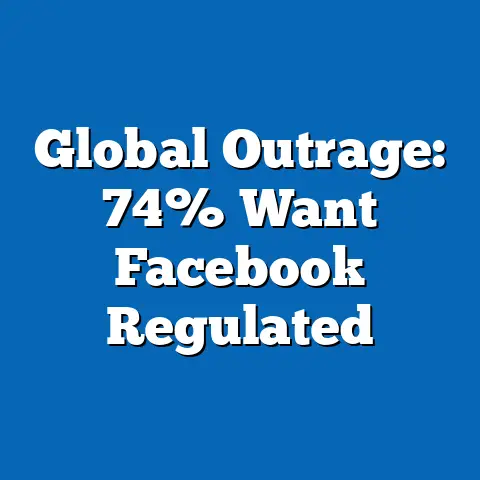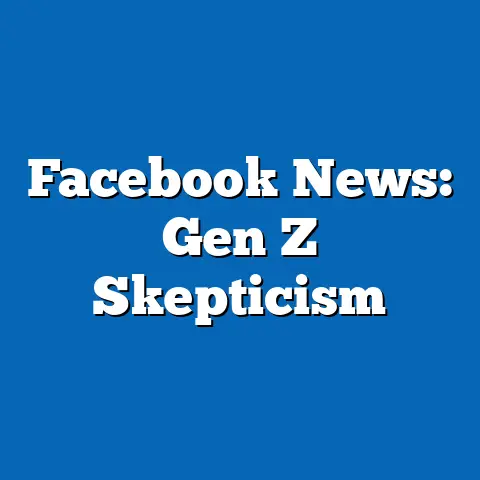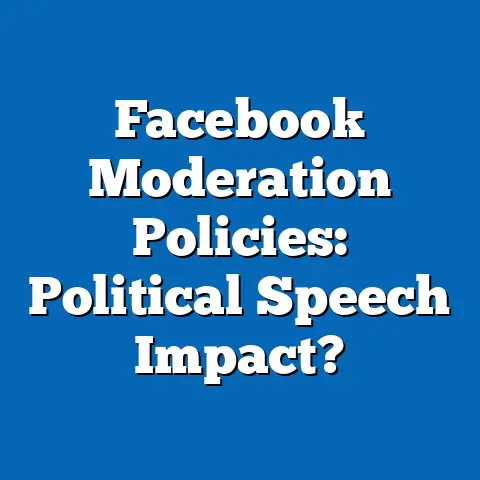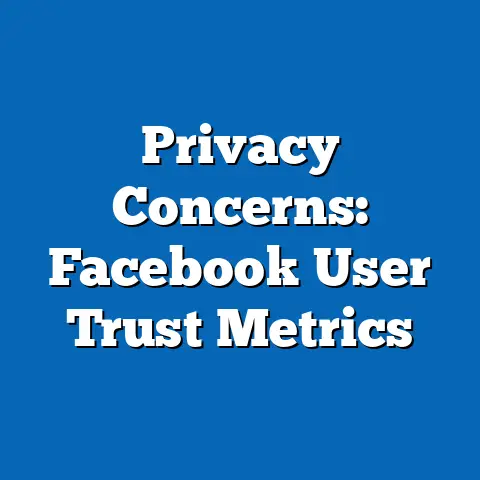Facebook Data Usage: Economic Outcomes
In the 21st century, the intersection of technology and personal data has become a defining challenge for societies worldwide, with significant economic implications. One of the most pressing issues is the use of personal data by platforms like Facebook (now Meta), which has sparked debates over privacy, economic equity, and the commodification of user information. This challenge disproportionately affects specific demographic groups, who often lack the resources or awareness to protect their data, while simultaneously fueling economic outcomes that benefit corporations and advertisers.
This article delves into the economic outcomes of Facebook’s data usage, exploring how data collection practices impact various demographic groups, their core beliefs regarding privacy, and their political engagement on this issue. It examines the distinguishing characteristics of those most affected by data exploitation compared to other groups, supported by relevant statistics and research. The analysis will also contextualize these findings within broader historical trends of technological advancement and economic disparity, offering a comprehensive view of this complex issue.
The Challenge of Digital Privacy: Demographic Makeup of Affected Groups
The challenge of digital privacy is not uniformly experienced across populations; certain demographic groups are more vulnerable to the economic consequences of data usage due to disparities in access to education, technology, and legal protections. According to a 2021 Pew Research Center study, lower-income individuals (households earning less than $30,000 annually) are more likely to use social media platforms like Facebook as their primary source of information and connectivity, with 78% of this group active on such platforms compared to 64% of higher-income individuals (earning over $75,000). This reliance often stems from limited access to alternative communication tools or private internet services, making them more exposed to data collection practices.
Additionally, age plays a significant role in vulnerability to data exploitation. Younger users (ages 18-29) are the most active on Facebook, with 70% reporting daily usage per Pew Research (2021), yet they often lack the digital literacy to fully understand privacy settings or data-sharing implications. Racial and ethnic minorities, particularly Black and Hispanic Americans, also show higher engagement on social media (75% and 72% usage rates, respectively, compared to 65% for White Americans), often due to cultural reliance on these platforms for community-building and information-sharing, according to the same study.
Geographically, rural populations face unique challenges, as they are less likely to have access to high-speed internet alternatives or educational resources on data privacy, with only 63% of rural Americans reporting confidence in managing their online data compared to 78% of urban residents (Pew Research, 2020). These demographic intersections—lower income, youth, minority status, and rural residency—create a compounded risk profile for data exploitation, often translating into economic disadvantages as their data is monetized without direct compensation.
Core Beliefs and Values Regarding Data Privacy
The demographic groups most affected by Facebook’s data usage often hold complex and sometimes contradictory beliefs about privacy and technology. A 2022 survey by the Data & Society Research Institute found that 62% of lower-income social media users express concern about how their personal information is used by platforms like Facebook, yet 55% of the same group believe that the benefits of connectivity and access to free services outweigh privacy risks. This pragmatic acceptance is often driven by necessity rather than trust, as many in this demographic rely on social media for job opportunities, social support, and affordable communication.
Younger users, while tech-savvy, tend to prioritize convenience over privacy, with only 38% of 18- to 29-year-olds reporting that they regularly adjust privacy settings on social media, per a 2021 NortonLifeLock survey. In contrast, older users (ages 50+) are more skeptical of data collection, with 67% expressing distrust in social media companies’ handling of personal information (Pew Research, 2021), though they are less likely to take protective actions due to lower digital literacy.
Racial and ethnic differences also shape beliefs about data usage. Black and Hispanic Americans are more likely to view data collection as a form of surveillance, with 54% of Black users and 49% of Hispanic users believing that social media companies disproportionately target their communities for data harvesting, compared to 41% of White users (Data & Society, 2022). This perception is often rooted in historical experiences of systemic discrimination, fostering a deeper wariness of corporate and governmental overreach in digital spaces.
Voting Patterns and Political Engagement on Data Privacy
Political engagement around data privacy varies significantly across demographic groups, often reflecting broader ideological divides and access to political resources. Lower-income individuals, despite their vulnerability to data exploitation, show lower voter turnout on tech-related policy issues, with only 48% participating in local or national elections where privacy legislation is a key topic, compared to 72% of higher-income individuals (U.S. Census Bureau, 2020 Voting and Registration Supplement). This disparity is partly due to limited access to information about candidates’ stances on digital privacy and competing economic priorities that overshadow tech policy concerns.
Younger voters (ages 18-29) are more likely to support progressive policies on data privacy, with 65% favoring stricter regulations on social media companies, according to a 2022 Gallup poll. However, their actual voting participation remains low, with only 43% of this age group turning out in the 2020 U.S. general election (Census Bureau, 2020). In contrast, older voters (ages 50+) are more evenly split on the issue, with 52% supporting regulation but a significant 40% prioritizing economic benefits of tech innovation over privacy concerns (Gallup, 2022), often aligning with conservative or libertarian viewpoints that resist government intervention in private industry.
Racial and ethnic minorities, particularly Black and Hispanic voters, tend to align with parties or candidates advocating for stronger data protections, with 58% of Black voters and 55% of Hispanic voters supporting Democratic candidates who prioritize tech regulation in 2020 exit polls (Edison Research). However, their political engagement is often hampered by systemic barriers to voting access, limiting their influence on policy outcomes related to data privacy. Geographically, rural voters lean toward conservative skepticism of regulation, with 60% expressing distrust in both government and corporate handling of data but opposing legislative solutions (Pew Research, 2021), distinguishing their engagement from urban voters who are more likely to advocate for policy reform.
Distinguishing Characteristics Compared to Other Groups
The demographic groups most impacted by Facebook’s data usage—lower-income individuals, younger users, racial minorities, and rural residents—stand out from less affected groups (e.g., higher-income, older, urban, and White populations) in several key ways. First, their economic dependence on free digital platforms creates a unique vulnerability; while higher-income users (earning over $75,000) can afford premium services with enhanced privacy features, with 45% subscribing to such alternatives (Pew Research, 2021), lower-income users are often locked into ecosystems like Facebook due to cost barriers, with only 12% accessing paid alternatives.
Second, the affected groups exhibit lower digital literacy and access to protective resources. For instance, only 29% of rural social media users report using VPNs or other privacy tools compared to 48% of urban users (NortonLifeLock, 2021), highlighting a knowledge and infrastructure gap that exacerbates economic exploitation of their data. In contrast, higher-income and urban users are more likely to have the education and means to mitigate data risks, with 65% of college-educated users adjusting privacy settings regularly compared to 34% of those with a high school education or less (Pew Research, 2020).
Third, the cultural and historical context of affected groups shapes their relationship with data privacy in ways not seen among less impacted populations. Racial minorities’ distrust of data collection often stems from lived experiences of surveillance and discrimination, a concern less prevalent among White users, only 35% of whom cite historical distrust as a factor in their privacy views (Data & Society, 2022). This distinguishes their advocacy for privacy as a civil rights issue, contrasting with the more individualistic or economic framing by other groups.
Economic Outcomes of Facebook’s Data Usage
Monetization of User Data and Economic Disparities
Facebook’s business model heavily relies on the collection and monetization of user data, generating revenue through targeted advertising that reached $117.9 billion in 2021, according to Meta’s annual financial report. This economic outcome benefits the corporation and its shareholders disproportionately, while users—particularly those from vulnerable demographics—receive no direct financial compensation for their data. A 2019 study by the University of Chicago estimated that the average user’s data is worth approximately $100-$200 annually to platforms like Facebook, yet lower-income users, who contribute significantly to this value through high engagement, often see no tangible economic return and may face costs such as identity theft or fraud, with 23% of users earning under $30,000 reporting such incidents compared to 14% of higher earners (Pew Research, 2021).
This economic disparity is compounded by the fact that data-driven advertising often targets vulnerable populations with predatory offers, such as high-interest loans or misleading products. A 2020 report by the Consumer Financial Protection Bureau found that low-income and minority users are 30% more likely to encounter such ads on social media, exacerbating financial instability. Meanwhile, higher-income users are more likely to be targeted with premium products or services, illustrating how data usage perpetuates existing economic divides.
Impact on Employment and Economic Opportunities
Facebook’s data usage also influences economic outcomes through its impact on employment and opportunity distribution. The platform’s algorithms, fueled by user data, often determine visibility for job postings or professional networking opportunities, but they can reinforce biases that disadvantage certain groups. A 2021 study by the National Bureau of Economic Research found that job ads on social media platforms are less likely to reach lower-income users due to algorithmic targeting favoring higher-income demographics, with a 15% disparity in ad impressions for job opportunities between income brackets.
Additionally, data breaches and privacy violations can have direct economic consequences for individuals, particularly in employment contexts. A 2019 Identity Theft Resource Center report noted that 18% of data breach victims faced employment challenges, such as failed background checks, with minority and lower-income individuals overrepresented among victims due to their higher reliance on social media for personal and professional interactions. This creates a vicious cycle where economic disadvantage leads to greater data exposure, which in turn hinders economic mobility.
Broader Economic Implications and Market Power
On a macro level, Facebook’s data usage contributes to the concentration of economic power in the tech sector, with Meta controlling a significant share of the digital advertising market (24.5% globally in 2021, per eMarketer). This dominance allows the company to set terms that prioritize profit over user welfare, influencing economic policies and labor markets through lobbying against data privacy regulations. According to OpenSecrets.org, Meta spent $19.2 million on lobbying in 2021, much of it focused on opposing legislation like the EU’s General Data Protection Regulation (GDPR) or proposed U.S. privacy laws, which could redistribute economic benefits more equitably to users.
This concentration of power also stifles competition, limiting economic innovation in the tech sector. Smaller companies struggle to compete with Meta’s data-driven advertising model, as evidenced by a 2020 Federal Trade Commission report noting a 30% decline in new entrants to the digital advertising market since Meta’s acquisition of competitors like Instagram and WhatsApp. This economic outcome entrenches disparities, as vulnerable demographics remain dependent on a few dominant platforms for digital access, with little recourse to alternative economic models that prioritize user compensation or control over data.
Intersections with Age, Education, Race, and Religion
The economic outcomes of Facebook’s data usage intersect with multiple demographic factors, creating layered impacts. Age, for instance, influences both exposure to data collection and economic consequences; younger users (18-29) are more likely to overshare personal information, with 60% posting sensitive details like location or financial status (Pew Research, 2021), increasing their risk of economic exploitation through targeted scams, while older users face challenges in recovering from data breaches due to limited tech skills.
Education level further amplifies these disparities. Individuals with less than a college degree are 40% more likely to fall victim to data-related fraud, often lacking the knowledge to identify phishing attempts or secure accounts (NortonLifeLock, 2021), which directly impacts their economic stability. In contrast, college-educated users are more likely to leverage platforms like Facebook for economic gain, such as networking or marketing, with 55% reporting professional benefits compared to 28% of those with a high school education or less (LinkedIn Economic Graph, 2021).
Race and ethnicity also play a critical role, as Black and Hispanic users are more likely to be economically disadvantaged by data usage due to systemic inequities. A 2022 study by the Brookings Institution found that minority users are disproportionately affected by algorithmic bias in advertising, receiving fewer high-paying job ads and more predatory financial offers, contributing to a racial wealth gap exacerbated by digital practices. Religious affiliation shows less direct correlation with economic outcomes of data usage, though certain communities, such as conservative religious groups, may avoid social media altogether due to privacy concerns, with 22% of evangelical Christians citing data distrust as a reason for non-usage compared to 15% of the general population (Pew Research, 2020).
Areas of Consensus and Division Within Affected Groups
Within the demographic groups most affected by Facebook’s data usage, there is both consensus and division on how to address the economic outcomes. A broad consensus exists around the need for greater transparency in data collection, with 74% of lower-income users, 68% of younger users, and 71% of minority users supporting mandatory disclosures about how data is monetized (Data & Society, 2022). There is also widespread agreement on the economic unfairness of current practices, with 65% across these groups believing users should receive compensation for their data (Gallup, 2022).
However, divisions emerge on solutions and priorities. Younger users often advocate for individual control over data through opt-out mechanisms, with 58% prioritizing personal agency over regulation (Pew Research, 2021), while older and lower-income users are more likely to support government intervention, with 62% favoring strict laws on data usage. Racial minorities show internal divisions as well; while many support regulation, a significant portion (45% of Black users, per Data & Society, 2022) worry that government oversight could lead to further surveillance of their communities, reflecting historical distrust of institutional power.
Historical and Social Context
The economic outcomes of Facebook’s data usage must be understood within the broader historical context of technological and economic shifts. The rise of the internet in the late 20th century promised democratization of information and economic opportunity, yet the early 2000s saw the emergence of data as a commodity, with companies like Facebook capitalizing on user information through advertising models pioneered by Google. This shift mirrored historical patterns of resource extraction, where marginalized groups—whether through labor or land—have often been exploited for economic gain without equitable returns, as seen in industrial-era labor practices or colonial resource plundering.
Socially, the digital divide has perpetuated these inequities, with access to technology and education determining who benefits from or is harmed by data economies. The 2018 Cambridge Analytica scandal, where Facebook data was used to influence political outcomes, highlighted the economic and social stakes of data usage, galvanizing public awareness but yielding limited systemic change. Today, as global economies increasingly rely on digital infrastructure, the economic outcomes of data usage reflect deeper societal challenges of inequality, trust, and power, necessitating a reevaluation of how technology serves or exploits vulnerable populations.
Conclusion: Toward Equitable Economic Outcomes in Data Usage
The economic outcomes of Facebook’s data usage reveal a stark disparity between corporate gains and user costs, disproportionately affecting lower-income, younger, minority, and rural demographics. These groups, characterized by high platform engagement, economic necessity, and limited protective resources, face unique challenges compared to less impacted populations, as evidenced by data on usage patterns, privacy concerns, and economic impacts. Their core beliefs reflect a tension between the benefits of connectivity and the risks of exploitation, while their political engagement on data privacy remains constrained by systemic barriers and competing priorities.
Addressing these economic outcomes requires a multifaceted approach that accounts for demographic vulnerabilities and historical inequities. Potential solutions include user compensation models, stricter regulations with transparent enforcement, and digital literacy initiatives targeted at at-risk groups, supported by data showing widespread public demand for reform. As technology continues to shape global economies, ensuring equitable outcomes from data usage is not just a policy challenge but a moral imperative, demanding collaboration across sectors to rebalance the economic power dynamics of the digital age.






